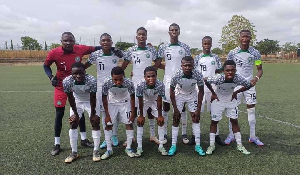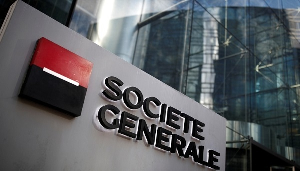- Home - News
- TWI News | TV
- Polls
- Year In Review
- News Archive
- Crime & Punishment
- Politics
- Regional
- Editorial
- Health
- Ghanaians Abroad
- Tabloid
- Africa
- Religion
- Election 2020
- Coronavirus
- News Videos | TV
- Photo Archives
- News Headlines
- Press Release
General News of Tuesday, 19 October 1999
Source: GNA
Nigeria opts for WAEC evaluation but...
Accra, Oct. 19, GNA - The President of the All-Nigeria Conference of Principals of Secondary Schools (ANCOPSS), Mr A. B. Amiebenomo, has stated that his country considers the West African Examinations Council (WAEC) as the only credible institution for educational evaluation at the end of the senior secondary course in Nigeria.
A statement issued by WAEC in Accra on Tuesday said Mr Amiebenomo made this observation at a meeting of the International Final Awards and Examiners' Appointment Committee of WAEC held in Accra on October 12.
The topic for discussion was the establishment of an alternative examining board to conduct the Senior Secondary Certificate Examination (SSCE) in Nigeria.
Mr Amiebenomo said even though there was the need for a change of system aimed at progress, this must be well planned and managed. Consequently, he called on WAEC to defer Nigeria's adoption of the Council's new international examination, the West African School Certificate Examination (WASSCE), from 1998 to 1999 to allow the country to satisfy the requirements.
This is because, going by existing world practice, it was necessary for the newly established examining board in Nigeria - the National Examinations Council- to produce its own syllabuses and distribute them to schools for study for three years before examinations could be conducted.
The meeting was attended by representatives of Ministries of Education responsible for secondary school education and universities and associations of principals of secondary schools as well as top management staff led by Dr Sylvia Boye, Registrar and Chief Executive of WAEC.
Member-countries of WAEC are Ghana, the Gambia, Liberia, Nigeria and Sierra Leone. The statement said in addition to the discussion on Nigeria, the meeting reviewed reports on examinations conducted between November 1998 and September 1999.
It also reviewed chief examiners' reports on Nigeria's senior school certificate examination for November-December 1998, senior secondary school certificate examination for November-December 1998 in Ghana and the May-June 1999 senior high school certificate examination in Liberia. The last of the GCE Ordinary and Advanced Level Certificates conducted in Ghana in May-June 1999 was also reviewed.
The statement said deficiencies observed, including inadequate preparation, poor grammatical expression and reliance on short notes, cut across candidates from the sub-region.
It also observed that other contributory factors included poor or delayed remuneration of teachers, unavailability of laboratories, equipment and infrastructure, lack of textbooks and large classes.
"It appears not much has been done by stakeholders in the education despite WAEC's regular statements on these weaknesses".
At country level, the statement said the meeting approved of penalties instituted against some candidates in the November-December SC/GCE Ordinary Level Examination held in Sierra Leone in 1998.
This included 79 examiners who collaborated with the candidates during marking and doctored their scores. On Liberia, the meeting noted the decision taken by the government to set up a committee to investigate factors responsible for the dismal performance of candidates in the 1999 Liberia Senior High School Certificate Examination.
In the case of Nigeria, the statement said the meeting observed that there was a high failure rate in the 1998 SSCE for private candidates with more than 40 per cent of the candidates scoring F9 in a number of subjects including English language.
This was described by Nigeria's chief Examiner in his report as "a massive show of poor knowledge of the rules of grammar". The use of locked mailbags to convey question papers by supervisors from custodian centres to examination centres to ensure that question papers were not tampered with while in transit by Nigeria was also noted.










